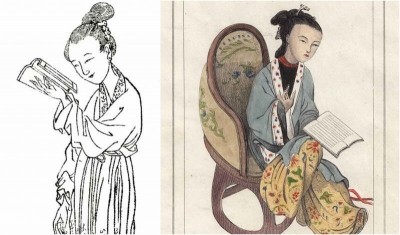
The first-known female Chinese historian was born into an illustrious family of writers and philosophers. Ban Zhao was the daughter of Ban Biao, who began working on the history of the Han Dynasty and after his death, his son (and Zhao’s brother) Ban Gu was put on the task of completing this. Ban Gu, who was then the official historian of the empire, was executed for palace fraud in 95 AD. Five years later, the responsibility of finishing this work fell on Ban Zhao, making her immortal in the pages of history.
About Ban Zhao
Ban Zhao born in Anling, Saanxi province of China. She married young – at the age of 14, but lost her husband in a few years. She never remarried and instead, devoted her life to pursuing academics and scholarship.
When Ban Gu was executed, and the dynastic history of the Han empire, Hanshu, was left incomplete, it was up to Ban Zhao to fill in her brother’s shoes and finish that monumental task. She added in the missing bits of Babiao (Eight Tables) and the genealogy of the mother of the emperor, which was not information usually recorded in that time period. Due to this, she became extremely popular in China.
Also, due to her reputation as a scholar and historian, Ban Zhao was invited to teach Empress Deng Sui and other court members, which only made her more politically influential. The empress and her consorts gave her the title “The Gifted One” and soon, she became the Empress’s lady-in-waiting. The empress also continually sought her advice on matters pertaining to her son, Emperor Shang of Han.
Apart from these duties, Ban Zhao was also the royal librarian and is said to have overseen the copying of manuscripts in bamboo and silk onto a recent invention – paper.
Ban Zhao was also a poet and wrote many poems during her time, and also “Lessons for Women”, a treatise that looked into the education of women in the empire. Although the document spoke about a code of conduct for women and quickly became popular all over China, it focused more on how women needed education.
Excerpt
In her book “Nu Jie” (Lessons for Women), Ban Zhao writes about the quality of humility and why it is important for women to embrace it.
On the third day after the birth of a girl the ancients observed three customs: first to place the baby below the bed; second to give her a potsherd [a piece of broken pottery] with which to play; and third to announce her birth to her ancestors by an offering. Now to lay the baby below the bed… should regard it as her primary duty to humble herself before others. To give her potsherds with which to play indubitably signified that she should practise labour and consider it her primary duty to be industrious. To announce her birth before her ancestors clearly meant that she ought to esteem as her primary duty the continuation of the observance of worship in the home.
Some have argued that Ban Zhao’s work could be seen as among the earliest works of feminism. Though “Lessons for Women” may not seem so, scholars point to the fact that Ban Zhao was not only extremely intelligent but also highly influential. She’s believed to have written this work as a guide for women to survive and subtly negotiate the complex demands of society back then, and she did not remarry despite a short marriage, and perhaps couples this freedom with her intelligence to become influential.
Ban Zhao’s grandmother was Ban Jiyeu who lived during the Western Han Dynasty and was a poet and scholar. Jiyeu is the title given to a third-rank palace lady, and her personal name remains unknown. She is best-known for her poem ‘Yuan Ge Xing” or “Song of Resentment”, where she compares herself to an autumn fan that is ignored. It is written in yuefu style – poems composed like folk songs.
Picture Credit : Google




